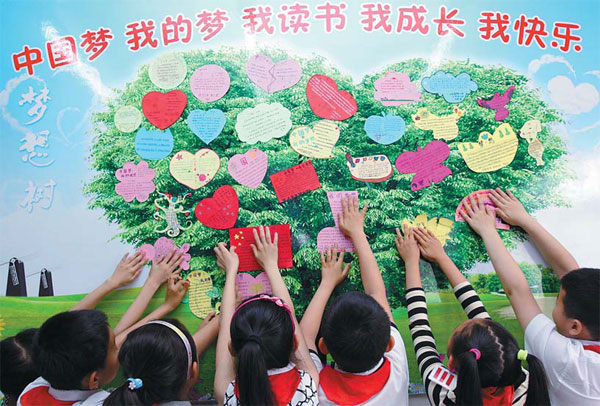|
High-school student Zhang Nietian could not believe that his "Chinese dream"-themed letter to President Xi Jinping got a reply last month.
Zhang, 17, chairman of the students' union in Shijiazhuang No 1 High School of North China's Hebei province, wrote a letter on behalf of the school's more than 3,000 students to the president on April 7.

Primary school students in Jinan, Shandong province, share their book reviews in a reading activity themed "My Dream, Chinese Dream" in May. Sheng Hong / Xinhua
"The Chinese dream is the dream of everyone of us, the young students. Just as you have said, it's the greatest dream of the Chinese people to achieve the great rejuvenation of our nation," Zhang wrote in the letter. "We will study hard to increase our knowledge and fulfill the dream."
The students' letter was answered by Xi on May 4, China's Youth Day.
In his letter, Xi greeted the students and praised them for their ambition and enthusiasm toward the country.
Xi expressed his wishes for the students to uphold their beliefs, study hard, and make contributions to the fulfillment of the "Chinese dream".
"I felt excited after receiving the letter from the president," Zhang said on Tuesday. "We will keep the President's words in mind, be diligent and study hard."
The "Chinese dream" vision was launched to prominence by Xi on Nov 29, when he visited The Road of Rejuvenation exhibition at the National Museum of China. Xi was elected as general secretary of the Communist Party of China Central Committee on Nov 15.
"Everybody has one's own ideal and pursuit as well as one's own dream," Xi said during the visit. "History tells us that everybody has one's future and destiny closely connected to those of the country and nation."
During a keynote speech on March 17, Xi said the dream of a great rejuvenation of the Chinese nation "is a dream of the whole nation, as well as of every individual," adding that it could only be realized by the people.
Everybody has a dream
Shortly after Xi's remarks, many people shared their own dreams through the Internet, which range from "less corruption" to "higher income" and "a more equal society".
"My version of the Chinese dream is national prosperity, social progress and people's happiness," Yi Zhongtian, a renowned Chinese history scholar, wrote in his micro blog. "We need a Chinese dream, but also more practitioners to fulfill it."
Li Liancheng, a deputy to the National People's Congress and also a village official from Puyang city in Central China's Henan province, said that the Chinese dream is the farmers' dream.
"If the farmers nationwide could lead a better life, the Chinese dream would be realized," Li said, adding that farmers should have equal rights to education, health insurance and pensions that urban residents enjoy.
On May 31, one day ahead of International Children's Day, Vice-President Li Yuanchao called for teaching about the Chinese dream to children, to inspire them to become contributors to national rejuvenation.
The Chinese Young Pioneers, the country's largest children's organization, should promote the Chinese dream among children and inspire their interest in science and creativity, Li said when visiting students in Xianyang city of Northwest China's Shaanxi province on Friday.
Common goal
Zhou Tianyong, deputy director of the International Strategy Institute with the Party School of the CPC Central Committee, said that Chinese dream has set a common goal among the public, and it is expected to make the nation more cohesive.
"Just like the American dream, which has become a core value of the people in the United States, the Chinese dream will also become the people's common ideal and belief," he said.
The fulfillment of the "Chinese dream" is based on the country's rapid economic growth, which has provided more opportunities for the people, especially younger talents, Zhou said.
About 272,900 Chinese students who studied overseas came back to China after graduation last year, with a year-on-year increase of 46.57 percent, according to data released by the Ministry of Human Resources and Social Security on March 21.
"China's rapid development has served an engine for global growth, and Beijing's pursuit of peaceful development has made great contributions to world peace," said Zhang Lian'gui, a professor of international study with the Party School of the CPC Central Committee.
The Chinese dream will not pose any threat to other nations, since peace is in line with the heritage of the country's thousands of years of history and culture, he said.
Buddhist master Hsing Yun, founder of Taiwan's influential Fo Guang Shan Monastery, has spoken highly of the "Chinese dream", according to a report of the Xinhua News Agency.
"It is a big dream and a great one," the 86-year-old said on April 6 while attending a forum in the town of Bo'ao in south China's Hainan province.
"It means making China a strong and harmonious country, where justice and fairness is honored, people are happy and the social environment is safe and comfortable," he was quoted as saying. |

